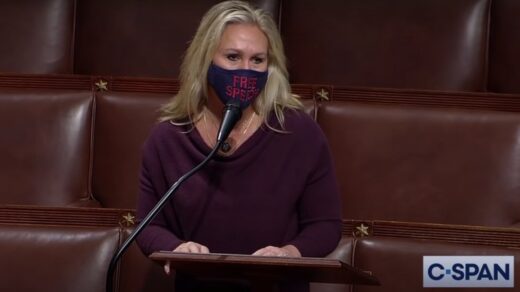Montana Bill Would Erase Trans People, Threaten Women’s Rights
Author: Trudy Ring

Montana was among the first states to grant women the right to vote. But now the state is set to deliver a setback to gender equality — affecting both cisgender and transgender women as well as all trans and nonbinary people.
Senate Bill 458 would define sex based on reproductive characteristics — females would be defined by their ability to produce an egg and males by their ability to produce sperm, “under normal development.” Those who can’t do so because of a condition present at birth would be defined according to their “nonambiguous” genitalia, the bill reads. Intersex people would be assigned a gender based on the characteristic deemed predominant. The bill’s provisions would affect more than 40 sections of state law.
If the bill becomes law — it has passed the Montana Senate and is pending in the House — it will write trans people out of existence and promote the stereotype that women should be excluded from certain jobs because their role in reproduction is the most important thing about them, activists say.
The bill was the subject of a recent conference all organized by the Human Rights Campaign and the American Civil Liberties Union. It’s “terrible in many ways” and would have a “really egregious impact … on the transgender population of Montana and possibly other states if it begins to spread across the country,” attorney and law professor Paul Smith said on the call.
It would make it difficult, if not impossible, for trans people to live in the state successfully, he said, forcing them to either leave Montana or forgo the gender-affirming procedures needed for their well-being. Trans people couldn’t have their lived gender recognized on their birth certificates, driver’s licenses, or other legal documents, and it would set up a situation in which their use of public restrooms would be policed.
The legislators behind the bill are “simply refusing to accept the concept that transgender individuals exist,” he said.
It’s the first bill he knows of to define sex so narrowly, but “if it starts to spread across the country, it’s going to be a real scourge,” added Smith, a professor at Georgetown Law.
And “trans people won’t be only people to suffer” if the bill becomes law, said Ria Tabacco Mar, director of the ACLU’s Women’s Rights Project.
Women’s reproductive capacities have been used against them for years, she said. For instance, she said, many states once excluded women from juries because jury service would interfere with what was considered to be a woman’s proper role — keeping house and taking care of children.
The Montana bill is based on “impermissible stereotypes about the right way to be a woman,” she noted, and could enable all sorts of sex discrimination, such as denial of employment to women with children.
Fighting this legislation is “the right thing to do for all of us,” she said.
SB 458 also conflicts with the Montana constitution, said Akilah Maya Deernose, a staff attorney with the ACLU’s Montana affiliate. The state constitution has an individual dignity clause, stating, “Neither the state nor any person, firm, corporation, or institution shall discriminate against any person in the exercise of his civil or political rights on account of race, color, sex, culture, social origin or condition, or political or religious ideas.”
“It’s directly at odds with what this sweeping bill aims to do,” Deernose said. It’s not up to legislators to interpret this clause, she added, but up to the courts.
What’s more, the Montana Human Rights Bureau, which enforces certain antidiscrimination laws, has been following the 2020 U.S. Supreme Court decision in Bostock v. Clayton County in doing so, she said. That ruling held that discrimination based on sexual orientation of gender identity is sex discrimination, forbidden under Title VII of the U.S. Civil Rights Act of 1964. SB 458 would go against that too.
It would also be devastating to Montana’s economy, Deernose said. Federal agencies that fund state universities and other institutions have the right to deny money to those that discriminate, and if these agencies do so, it could cost the state up to $7.5 billion, half its annual budget, she said.
The ACLU may sue if the bill becomes law. Smith said it’s vulnerable to a federal constitutional challenge under both the Equal Protection Clause and the Due Process Clause of the U.S. Constitution. He has more than a casual familiarity with constitutional law — he was counsel to the plantiffs in Lawrence v. Texas, the case that led the U.S. Supreme Court to strike down all remaining anti-sodomy laws.
As bad as SB 458 is, it’s not the only anti-LGBTQ+ bill pending in Montana. Both the House and Senate have approved Senate Bill 99, which would ban gender-affirming care for minors in the state. It’s now awaiting either a signature or veto by Republican Gov. Greg Gianforte, who has said only that he’ll consider all legislation carefully. Lambda Legal, the national ACLU, and the ACLU of Montana intend to sue if the bill becomes law.
The Senate has also OK’d a bill that would require schools to obtain parental permission before a student uses a new name, nickname, or pronouns that are perceived as not matching the student’s assigned gender at birth, essentially forcing schools to out trans students to their parents. It is pending in the House.
From Your Site Articles
Original Article on The Advocate
Author: Trudy Ring




